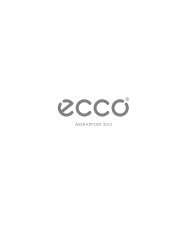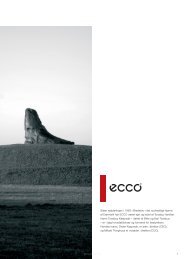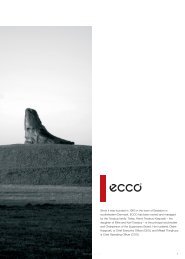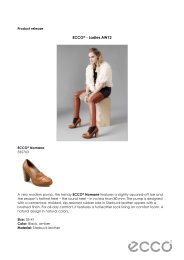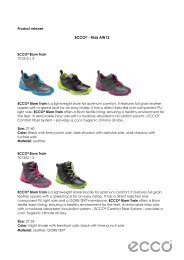Annual Report 2009 - Ecco
Annual Report 2009 - Ecco
Annual Report 2009 - Ecco
Create successful ePaper yourself
Turn your PDF publications into a flip-book with our unique Google optimized e-Paper software.
ECCO’s internal audits are supplemented by external audits, which help<br />
ensure that the work is carried out professionally.<br />
Not just words and bits of paper<br />
It is ECCO’s experience that working with the<br />
Code of Conduct is most successful when<br />
local employees are involved. Therefore<br />
ECCO has trained up a global audit team.<br />
The internal audits are an essential part of the<br />
business, but ECCO can also learn a lot from<br />
external auditors. Therefore the process is<br />
supplemented by external audits, who<br />
help ensure that the work is carried out<br />
professionally.<br />
ECCO’s audits are implemented by measuring<br />
the shoe factories and tanneries against 150<br />
High demands on suppliers<br />
Before becoming a supplier to ECCO, suppliers<br />
must undertake to observe ECCO’s Code of<br />
Conduct as part of the contract. And at the<br />
same time, the supplier must be prepared<br />
to be assessed accordingly. For ECCO, it is<br />
just as important that the supplier have<br />
control over the environment and the working<br />
conditions of his employees as it is for ECCO<br />
to have control in its own factories.<br />
different points related to ethical commitments.<br />
These points include handling of<br />
chemicals, energy saving, waste handling,<br />
accident prevention, training in fire fighting,<br />
working hours, wages and working conditions,<br />
discrimination, training of temporary workers<br />
and much more.<br />
In practice, the audit is carried out by means<br />
of a thorough inspection of the entire factory<br />
area, from the storage facilities and production<br />
lines right through to the canteen and<br />
toilet areas, including the waste management<br />
Audits on suppliers of components and<br />
materials such as shoelaces and sole inserts<br />
are just a couple of examples of the many<br />
audits carried out. The individual auditing<br />
processes for the suppliers are the same as<br />
for ECCO’s own production units. This means,<br />
for example, that ECCO’s own audit team<br />
ensures that ethical commitments are being<br />
met by suppliers on a local level. So when a<br />
facilities. This analysis is cross-checked<br />
by reviewing main documents and by<br />
interviewing employees. Finally, all the points<br />
are compiled for a meeting in which a status<br />
report is delivered and decisions can be made<br />
together with the local management.<br />
Final results are then later reported to other<br />
factories, where the information can be used<br />
for motivation and comparison.<br />
supplier in Indonesia is being audited, this is<br />
carried out by ECCO employees from ECCO’s<br />
Indonesian shoe factory.<br />
The philosophy behind ECCO’s audits is based<br />
on partnership, openness and training. With<br />
this approach, ECCO hopes to achieve a long<br />
and mutually rewarding collaboration with the<br />
suppliers.<br />
ECCO’s Code of Conduct & Environmental Statement <strong>2009</strong> / Not just words and bits of paper / High demands on suppliers 61



